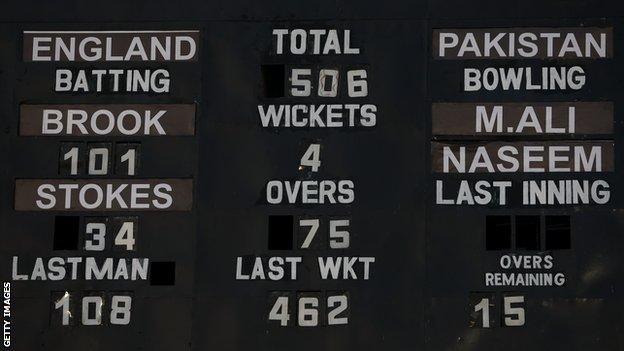[ad_1]

After the build-up to this match, we should have expected plenty of runs.
Everything surrounding England’s first Test in Pakistan for 17 years was extraordinary, so it should have come as no surprise when the cricket itself turned out to be utterly incredible.
The illness that tore through the England camp meant they could only confirm a fit XI two and a half hours before the scheduled start.
Had enough players not emerged from the sick bay, the match would have been postponed for 24 hours. The way it panned out, Pakistan could have done with a day’s delay. Much more of this from England and they might want to send them away for another 17 years.
“We don’t feel like we want to be held back by the narrative of how Test cricket needs to be played,” said captain Ben Stokes before the match.
“We’re in an era now with English cricket, with myself and Brendon McCullum leading the red-ball cricket, trying to let spectators view the game in a different way.”
Joe Root put it more succinctly.
“Smack it, score fast and take wickets. Pretty simple,” he said.
These are not just words, England are practising what they preach.
They are anarchists, disruptors and innovators, potentially changing the way Test cricket is played forever.
It will take a long time to know for certain, but we could be witnessing an irreversible shift, like when Dick Fosbury gave his flop to the high jump, Babe Ruth brought regular home runs to baseball or the Netherlands played their brand of ‘total football’.
England don’t like the ‘Bazball’ label, so perhaps we should look for some new terminology. Anything before coach McCullum arrived can be BB (Before Baz) and anything after AB (Year of our Baz).
The early days of the AB era, the English summer, felt like a wild fling that might not last. The Trent Bridge chase – their fifth highest in Test history – against New Zealand, and the Edgbaston stroll of 378 to beat India.
Would England be able to do it again away from home comforts? Would the fire still burn so brightly when they were reunited with McCullum after some time apart?
The answers came unequivocally on a day in Rawalpindi that was historic not only for England’s long-awaited return to Test cricket in Pakistan, but also for the records they smashed in one of the most dazzling collective displays of batsmanship the game has ever seen.
Zak Crawley’s fastest hundred by an England opener, Harry Brook’s quickest ton by an England batter in an overseas Test and the fastest team to 400 and 500 in a Test innings.
The close-of-play score of 506-4 the most runs any team has ever scored on the first day of a Test – and England only faced 75 overs. If they had been afforded the full 90, their scoring rate of 6.74 would have got them to 607.
Yes, the pitch could have been dug from the M6 and Pakistan performed like a team who had not played cricket before, but to downplay England’s achievement is like saying The Beatles sold a few records.
If you want to know just how different the England effort is to the rest of the world, Australia needed 152.4 overs to accumulate 598-4 declared in the ongoing first Test against West Indies in Perth.
How England have done it is by giving the players utter freedom to explore the limits of what is possible and the faith of knowing they will not be punished if they fail.
Crawley was backed by Stokes and McCullum through a lean summer, to the point that some of McCullum’s comments seemed faintly ridiculous.
“I look at a guy like Zak and his skillset is not to be a consistent cricketer. He’s not that type of player,” said McCullum.
When Crawley bats like he did on Thursday, the first of four England batters to register a hundred, McCullum’s words make perfect sense.
Ben Duckett was in danger of being most remembered for tipping a pint of beer over James Anderson in a Perth nightclub. In his six years away from Test cricket a broken hand meant he had to effectively learn how to hold a bat again.
He was brought back into the Test set-up at the end of the summer and given a second chance at the highest level in Rawalpindi. Despite being one of the worst hit by the virus, he cracked his maiden century.
Ollie Pope’s promotion to number three has gone so well he now looks to have been anointed as England’s next captain. Even with the distraction of standing in behind the stumps for the ill Ben Foakes, he helped himself to the least flashy 90-ball hundred you will ever see.
The coup de grace came from Brook, who had a poor T20 World Cup and, with only one Test cap to his name, could easily have been moved aside to accommodate England’s spin-bowling all-rounders.
Not a bit of it. By taking Saud Shakeel for six fours in a single over he closed in on the fastest ton ever by an England batter and only missed Gilbert Jessop’s 120-year-old mark of 76 balls by four deliveries.
All of this coming amid the glorious mayhem that is touring Pakistan.
Even without the confusion brought by the illness in the England camp, the lead-up to the first Test included the following: the Sky commentary team inadvertently commandeering the TMS bus, TMS producer Tim Peach getting a rather large electric shock when trying to fix the broadcast equipment, scorer Andy Zaltzman’s laptop charger smouldering with smoke and Vic Marks taking lunch to the Rawalpindi Stadium inside his hat, like an off-spinning Paddington Bear.
England, the chief mayhem-makers, may only just be getting started, too.
Ben Stokes has already moved to 34 not out from 15 balls, while Liam Livingstone, one of the world’s premier white-ball destroyers, and Will Jacks, owner of a century in The Hundred, are still to come.
“Hopefully we can go again tomorrow, get a big one and score a thousand,” joked Crawley.
This really is a new way of playing Test cricket.
Embrace the chaos.
[ad_2]




